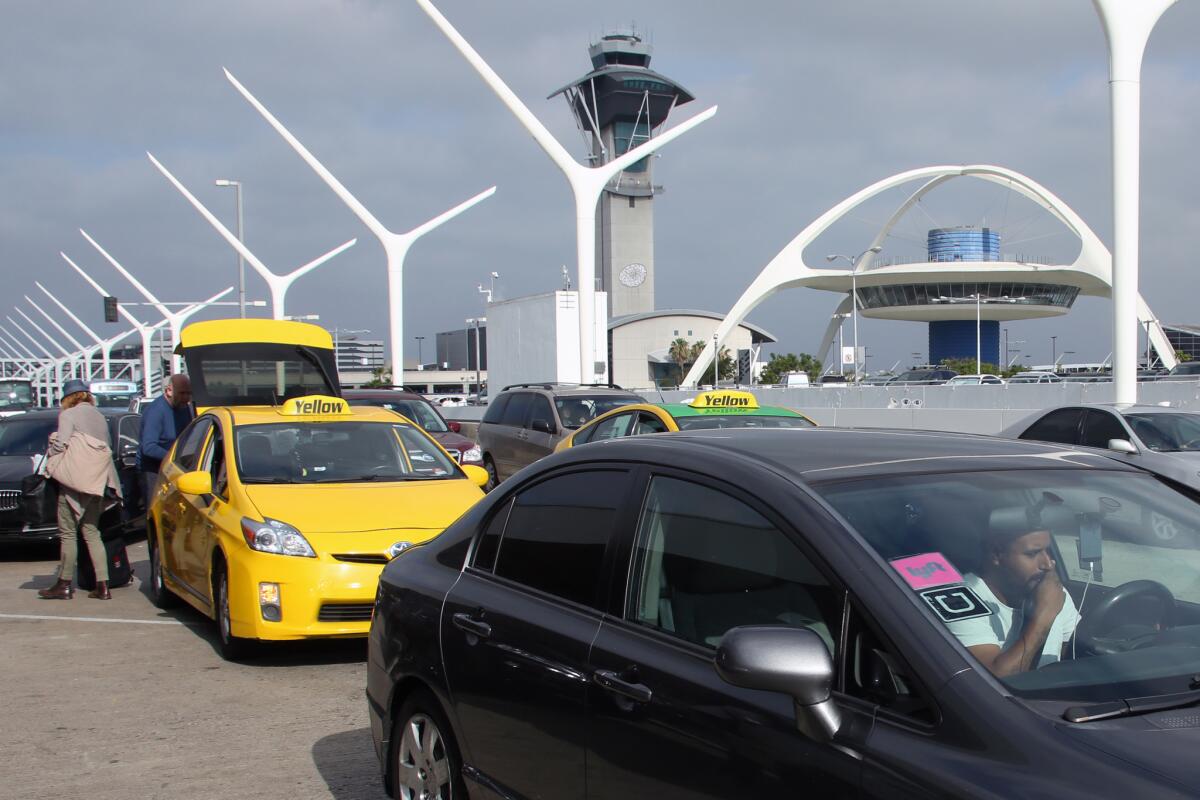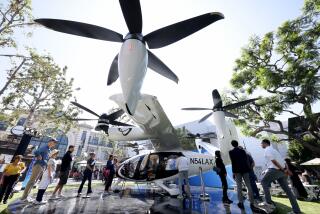L.A. hits the brakes on plan to allow Uber at LAX

A car with Uber and Lyft stickers leaves the departures area of LAX, with taxis behind it, last month.
The push to make Los Angeles International Airport the largest in the nation to allow Uber and Lyft has hit an obstacle at City Hall as the ride-hailing services battle with the powerful taxicab industry for influence.
Last month, city officials cleared the way for the app-based companies to pick up passengers at LAX. But on Wednesday, the City Council voted overwhelmingly to slow down the process and take a closer look at the issues.
The outcome is being closely watched not just by people who use LAX but by other cities that are debating whether to allow ride-hailing at their airports.
LAX is the most lucrative and closely guarded piece of the traditional taxi industry’s stronghold in Southern California. Taxi leaders have fought to keep Uber and similar companies from operating there, saying they create unfair competition because drivers are held to a lower standard than licensed taxi drivers.
The taxi industry already has suffered a blow since Uber and Lyft — which are typically cheaper to use — began operating in Los Angeles two years ago.
Mayor Eric Garcetti has pushed to allow the services at LAX, promising in his State of the City speech in April that they would be available “by this summer.” And the new companies have built a broad base of support among passengers and drivers who say the apps make calling a car and paying for a ride easier than hailing a taxi.
The airport is the only way for the City Council to dictate how Uber and Lyft should operate in Los Angeles. A 2013 California Public Utilities Commission ruling that legalized ride-hailing across the state made an exception for airports. If the City Council decides to add more regulations to ride-hailing services operating at the airport, the rules would likely become common practice for most trips in L.A.
“It’s definitely the city’s greatest opportunity to get additional regulations that would apply de facto outside of LAX,” said Juan Matute, associate director of the UCLA Lewis Center and the Institute of Transportation Studies. “They didn’t have the authority before now.”
Lobbyists for both the ride-hailing apps and the taxi industry have spent considerable time trying to convince politicians that each one’s business model is best for the city.
Since 2013, eight taxi companies have spent $595,500 to lobby elected officials in L.A. City Hall. Uber and Lyft have spent $392,000 in that same period.
Officials working for taxi companies have donated to L.A. politicians for decades. In the last 21/2 years, they’ve given more than $25,000 to 13 of the current 15 council members through either their campaign or officeholder accounts.
In contrast, Lyft officials spent $5,300 on nine council members. Uber officials did not give directly to individuals.
Consumers, airport employees and the mayor “have all made it clear that it’s time for ridesharing to come to LAX,” Lyft spokeswoman Chelsea Wilson said in a prepared statement.
Uber spokesman Michael Amodeo said in an email that the company will “look forward to working with airport officials and city leaders to bring ridesharing to LAX by summer’s end.”
Taxi representatives will be fighting for fingerprint-based background checks and stricter insurance requirements, said William Rouse, general manager of Yellow Cab of Los Angeles and president of the Taxicab Paratransit Assn. of California. “We’re focused on things that we think will make passengers and the airport more safe,” Rouse said. “But we don’t have any guarantee that even one punctuation mark will change in these regulations.”
In a sign of battle, representatives for the taxi industry circulated a dossier showing that four Uber drivers who had been ticketed for minor infractions at LAX over the last 18 months had serious criminal backgrounds.
The Council’s 11-2 vote to weigh in on the Board of Airport Commissioners’ decision, which could open LAX to Uber, will prompt a 20-day period for members to discuss the regulations in committee. They will then have the option to approve the permit process as is or send it back to airport officials for further changes.
The councilmen who proposed the review said their concerns were not addressed before airport officials approved the permit process in July. At issue, they said, are whether the ride-hailing services’ driver background checks, which do not include a fingerprint scan, are effective, and whether drivers treat all passengers equally.
“I could not care less if the vehicle picking up passengers has a checkered paint job or a pink mustache or numbers on the back,” said Councilman Paul Krekorian. “But it’s our responsibility to make sure that every person is safe and is treated with dignity.”
The discussion period doesn’t necessarily mean regulations will change. But, Councilman Bob Blumenfield said, elected officials “have the right — and I would say the obligation — to review big decisions.”
Councilmen Mike Bonin and David Ryu voted against the motion to assert jurisdiction, and Gil Cedillo and Joe Buscaino were absent.
At the downtown City Hall meeting Wednesday, Uber drivers in aqua T-shirts and Lyft drivers in pink sat on opposite sides of the council chamber’s aisle. They urged the council to let the permit process continue uninhibited because LAX pickups would be a key source of revenue.
“I have asked every passenger I’ve taken to, or picked up from, various locations outside the airport the same question: ‘Do you want this?’” said Andrea Slater, an Uber driver. “They have unanimously stated, ‘Yes.’”
For more Los Angeles transportation news, follow @laura_nelson on Twitter. Follow @TheCityMaven for breaking news from Los Angeles City Hall.
MORE
Uber driver wounded in crossfire of possible gang-related shooting
After years of scandal, L.A. County jails get federal oversight and sweeping reforms
Meet L.A.’s newest mountain lion kittens
More to Read
Sign up for Essential California
The most important California stories and recommendations in your inbox every morning.
You may occasionally receive promotional content from the Los Angeles Times.












